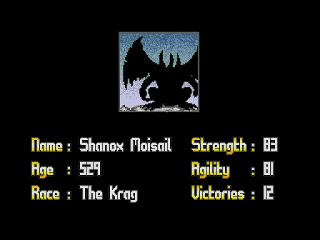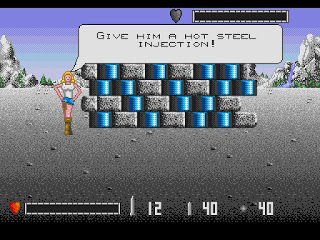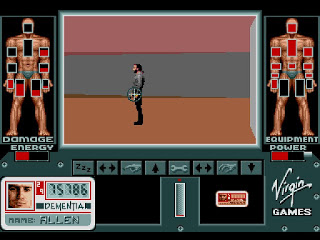
Name:Cybercon III
Number:82
Year:1991
Publisher:US Gold
Developer:The Assembly Line
Genre:FPS
Difficulty:5/5 (exclusively due to controls)
Time:3 hours 45 minutes
I have not played a true FPS that controls worse than Cybercon III. I have also played very few games that obfuscate their mechanics as much as Cybercon III. This combination of aspects is a fatal one. The difficulty of the thing starts off high and remains constant because of this. While I gradually got used to this it was less because of obtaining skill at the game and more because I was just memorizing the game. Its is because of this it is hard to say anything good about the game. Anything positive I have to say is buried under a game that seems like its actively fighting you at all times.

There are four parts to it, you have your standard movement and action key, QAOP and enter. Movement is very loose. You have an inventory/code entering system, its nature depends on whether or not you have the code system activated. You can't really do anything with items in your inventory, just pick them up and drop them. The game implies some can be interacted with via the code system, but I never saw how that would work. You have a power system, which is controlled primarily by the arrow keys and F1/F2. This determines which systems get power and how much power you have. Systems that get more power work better, while having multiple systems on at the same time reduces the draw. The gun increases in damage as you have more power, you move faster if you have the movement system activated. Protip, you don't need the game's navigation system activated, ever, I never found it useful.
Power is interesting, since I couldn't find much sources of it, preventing me from wanting to deal with most enemies. I did find that one preplaced item is a power source, but that doesn't get me more longterm. You have three banks, one that's always working, one that you can toggle from F1, which I believe are your items, and F2, which is an infinite generator that depeletes fast. I spent a good deal more time than I would have liked waiting for power to return, since power is used to repair and the only constant source drains quickly...
Finally, you have a two function weapon/camera selection system. I never thought to use the camera system...ever, because the only time I've use one was in Watch Dogs. The weapon system allows you to select your primary weapon, a plasma cannon, a secondary weapon found somewhere in-game, a power siphoning tool that doesn't work on much, and the code system. If you have the code system selected, that allows you to type a code. Either via the ,. keys, most of the letters and numbers (!) or on most things, the F9 key. Otherwise the inventory pops up, which has your items. The enter key, when a weapon is selected, fires.
There is also the option to make a few preset power settings, but I didn't make use of that. Perhaps that contributed something to my distaste for the game.
A few things of note, after reading the manual, that are vital to having fun with this game:
- To get sound with the game, you need to type -adlib after the exe file.
- There are elevators in this game, you can detect them via the codes on the wall. You need to do this to progress. The manual does not mention this.
- Figure out jumping with the enter key. The manual implies this is a duplicate of F10, which does a vertical jump. These are not very well explained.
- The save terminals show views of your actions leading up to this point. I am not sure if you press F9 on it or not.
- F9 is the use key, but its function changes depending on what mode you're on, either entering a code, getting a code, or siphoning power from something.

There was, before this, no way to actually find this out beforehand, short of watching a longplay on the game. I do not necessarily mind obfuscation in games, I would be a hypocrite if I did, but for central gameplay concepts? This game needed better explanation of its mechanics, and the manual is designed in a way that you might skip over some of the important parts. Most of it is taken up by a briefing, that sounds like its about the game's backstory, which a few seconds reading will reveal its cliche nature, followed by actual important info. And even that is obfuscated by the manual's awful writing. "The communication terminals are just like one of those 20th century computer games", written by someone I guarantee was patting himself on the back for thinking it up. TELL ME HOW TO PLAY THE GAME YOU DUMBASS!

Ahem, so the game itself, once you get past the control scheme is just a more advanced Space Station Oblivion, with respawning enemies. Objects can be touched, interrogated or shot, to usually predictable results. The whole game is true 3D, and an open world with no in-game loading. A very impressive technical achievement in 1991. Which makes it so infuriating that the game itself is borderline unplayable.

Combat is obtuse bordering on untenable. Your primary weapon's damage increases as it gets more power, but from the start its unreasonable to actually fight something. Tougher enemies will get the drop on you, and you can't trade blows with anything. Remember, diverting power to the shields also decreases the gun's strength. That means you need to dodge and hit an enemy consistently. The controls do not make this an easy task. Turning in the best of times is a short time between making a 360-degree turn and a 20-degree turn, since turning is aided by power, and you should turn off power. This makes any combat outside of situations where its unavoidable difficult to the point I never actually one any. Outside of some weak enemies near the start. If the game didn't allow you to rush past enemies, it would be completely unplayable, thanks to respawning enemies.

So, the controls are bad, the combat is obtuse, what is good about it? Well, if the level itself was in another game, it would probably be playable. In this game, however, it is not. The complex the game takes place in is a nice open level. I compared it to
Space Station Oblivion because it has a similar structure to that game, but with a more violent end-goal. Finding out what things you have to interact with is cool, but those objects are often too far apart. Walking speed is slow even with a good amount of power and downtime is far too frequent. Understanding this game requires too much of an investment to get any reward out of it.

To top it all off I'm pretty sure the path to win requires some Sherlock Holmes level of deduction, or at least some pretty good ones. By the time I decided to quit I had exhausted pretty much every area I could find. Perhaps if I made a map I could find something I missed, but I'm sure proceeding forward requires one to do some task that one might not even think is possible to begin with. The whole game up til this point required figuring out more and more, why stop there? I would hope the developers were generous enough to not make the player shoot the walls, or some other potentially endless requirement, but you never know with this game.

Even with far more limited resources, I think Space Station Oblivion did this puzzle action game shtick far better. 256 colors are useless if it doesn't mean much, as are those advanced systems the game shackled itself with. Later games in power armor, or at least Terra Nova, the Looking Glass Studios game, had the right amount of complexity. I guess I just don't care for the setting of a desolate dude in power armor scrounging for resources.
Weapons:
The only weapon I had was a plasma projectile that increased in strength as I added more power. I understand the game gives you missiles later. Either way I found it counterproductive to shoot things, in addition to control difficulties. 1/10
Enemies:
Hoo, boy. There are a wide selection of mobile and unmobile enemies, which more or less follow a straight progression system. With exception to one kind of enemy that follows you. Universally, their AI is incredibly dumb, they'll kill each other to walk past each other. Its really weird. 1/10
Non-Enemies:
None.
Levels:
Its interesting to see a complex, multi-floor gameworld with no loading, in 1992. But that's where the praise ends. The game is a labyrinth that tests your patience, a bad thing on top of having controls that already do that. I would have liked to see this in a different game, but here its yet another counterproductive aspect of the game. 1/10
Player Agency:
The controls are complex, too complex. There's a camera system I didn't use and for some reason the only use most reasonable keys have is for the code system. Jumping is unnecessarily complex, and the turning controls are bizarre. 1/10
Interactivity:
You can do some pretty interesting things with the game world, destroying scenery objects before it became commonplace. 2/10
Atmosphere:
None, really.
Graphics:
The PC version I played is mostly flat polygon models, with a few noise images overlaid on power sources. There's very little in the ways of animation. Its simple, and a bit confusing at first. It is functional though. 1/10
Story:
Generic AI takes over the world stuff. 0/10
Sound/Music:
There's no music, and the sound consists of weird Adlib sounds. Its very tiresome figuring out if a sound you heard is supposed to be a threat or not. 1/10
That's 8, an embarrassment for 1992. Others are more generous than myself. I would normally make a joke about that, but honestly, this game is probably better if you don't have to figure out the controls for as long a time as I did. Whether or not that would have made the game good is another question entirely. Some would lead towards yes...I do not know in either direction.
Other reviews are universally better than my own, some going as far as to say the game is flawless beyond the controls. The lower ones acknowledge that this doesn't have much to appeal to those seeking action games. One making a note of the puzzles says there's no "I'll get you next time" feeling to the puzzles. Come to think of it, a few places categorize this as a puzzle game, and yet I can't really remember much in the ways of any.
With that, 1991 is complete. Well, for FPS games. 1992 has quite a few interesting titles coming up, and I hope they're better than most of the ones I've been playing lately. On another note, I'm going to be shifting gears to focus less on three entries a week and more on consistently describing games. Perhaps not even describing the levels much in the case of more popular or shorter titles.




















































